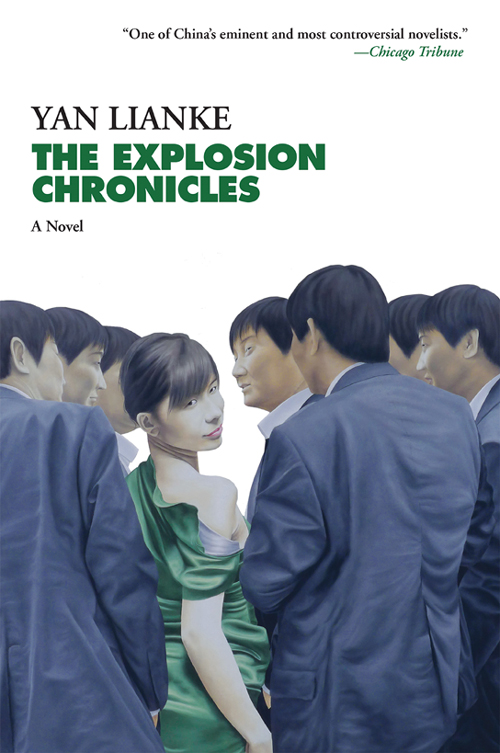
The Explosion Chronicles
A Novel
کتاب های مرتبط
- اطلاعات
- نقد و بررسی
- دیدگاه کاربران
نقد و بررسی

December 5, 2016
Lianke’s novel, a powerful, vividly imagined metafictional tale of a rural community’s rapid transformation into an urban metropolis, seeks to portray the “unrealistic reality... non-existent existence... impossible possibility” of life in contemporary China. The small mountain village of Explosion was founded during the Song dynasty; by the late 1970s it is the home of the extended Kong, Zhu, and Cheng families, and bears the marks of the Cultural Revolution. When Kong Mingliang, the second son of farmer Kong Dongde, decides to gain power, his supporters, rejecting the old communist village chief, Zhu Qingfang, literally drown Qingfang in spit. Thus begins the conflict that will define, and ultimately doom, Explosion; Mingliang brings prosperity to the villagers by teaching them how to steal from passing trains, but he is challenged by Qingfang’s daughter Zhu Ying, a sex-work entrepreneur who makes sexual shock troops of the young women of Explosion. Explosion’s growth is as fantastic, and as violent, as Ying’s relationship with the increasingly powerful Mingliang; flowers bloom and wilt according to the city’s fortunes, and foreign investment finally arrives thanks to an extraordinary set piece in which the townspeople create a Potemkin-village war-era Vietnam, complete with civilian casualties, to entice American investors. Lianke (The Four Books) notes his affinity with Latin American magical realism and calls his own work “mythorealism,” a style capable of “captur a hidden internal logic.” Readers will be haunted by the patterns of greed, revenge, and obsession that Lianke’s satire makes vibrantly visible.

Yan (The Four Books, 2015, etc.) returns with renewed vigor to the job of lampooning communist orthodoxy, capitalist ambition, and "contemporary China's incomprehensible absurdity."Yan puts what he calls "mythorealism"--a blend of fabulation, wishful thinking, and willful suspension of reality--to work in his yarn of a village flanking the Balou Mountains, a geographical entity familiar to readers of his Lenin's Kisses (2012). Nothing much happens in Explosion, a hamlet founded by a hundred-odd refugees from a long-ago volcano. Most of those people, Yan tells us, were named Kong or Zhu, and most "claimed to be descendants of Confucius, though there are no genealogical records to corroborate this claim." Alas, the newest generation of Explosionites lacks the conservative Confucian impulse to leave well enough alone, and soon a hutful of Kong brothers ("Our family will produce an emperor," says their mother, "but I don't know which of our four sons it will be") is vying to consolidate power against the resistance, intentional or not, of their fellow villagers. Says one would-be king Kong to his more effectively ambitious sibling, "My brother, your entire life you have been foiled by women." True enough. Yan's yarn might have been more fun if it had tacked into Lysistrata territory, but as it is it has the absurdist feel of an Ionesco or Durrenmatt piece, though without any of the heavy-handed obviousness. Indeed, his satire is careful and crafty: we all know that when Kong Mingyao says to Kong Mingliang, "Brother, we are truly corrupt," he is speaking of every Chinese official who would sacrifice the public good for private gain. As it is, the premise is so sweeping--a cabal of Explosionites decides to take their city from whistle-stop to mega-metropolis in a generation, going from hundreds to tens of millions, and all sorts of mayhem ensues--that it can be read as a kind of Swiftian satire, which probably won't do much to keep Yan out of trouble with the censors in Beijing.Overly broad but brilliant. COPYRIGHT(1) Kirkus Reviews, ALL RIGHTS RESERVED.

Starred review from October 15, 2016
Yan's latest translated-into-English title offers multiple rewarding options. As straightforward narrative, it follows the astounding transformation of Explosion, a rural mountain village, into a "megalopolis" through the entangled lives of the Kong family's four sons--a teacher, a politician, a soldier, and a caretaker. Add corruption, betrayal, power, obsession, and (of course) women, and the result is already an epic page-turner. Yet, as translator Rojas (kudos for his fluid rendering) illuminates in his context-revealing opening note, this is a multilayered marvel. Modeled after two traditional "historiographic genres"--dynastic histories and "local gazetteers" used to record Chinese history--the narrative features a fictional version of the author as both witness and transcriber, who unapologetically admits he's taken the assignment for "enormous financial compensation." Combining unflinching observation, stinging satire, and what (real-life) Yan calls "mythorealism" (using nonrealism to explain China's reality-defying reality), what happens to Explosion becomes a chilling metanarrative for China's explosive metamorphosis. VERDICT Despite his novel's heft at nearly 500 pages, Yan's mesmerizing ability to pull readers into this raw, subversive, not completely fictional world will continue to build his international audiences. Mo Yan was the first Chinese national to be awarded the Nobel for Literature; Yan just might be the next.--Terry Hong, Smithsonian BookDragon, Washington, DC
Copyright 2016 Library Journal, LLC Used with permission.

























دیدگاه کاربران